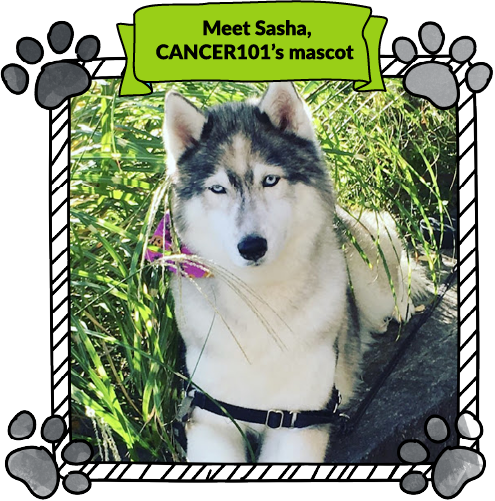Managing cancer can be a stressful experience, and the unconditional love and companionship of a pet can be comforting and provide you with support during this time. The “Pet Effect” is a phenomenon that refers to the mutually beneficial relationship that’s formed between people and their pets and the psychological, physical and social benefits. A few of the health benefits of a pet companion include decreased blood pressure and cholesterol, as well as an increase in the opportunity for exercise and socialization.1 Pets can also provide social support, reduce loneliness, boost your mood and decrease levels of cortisol, which is a stress-related hormone.2 The majority of people with pets have had a positive impact on their mental health, including a reduction in stress and anxiety.3
1,200,000
pets live with
someone newly
diagnosed with
cancer. 4
86%
of people with
pets said their pets
had a positive impact
on their mental
health.3
Therapy animals or animal-assisted therapy (AAT) has grown in popularity across many hospitals and treatment centers to help improve the well-being of patients. AAT is a type of therapy that can be combined with traditional medical care to facilitate healing. Trained animals (typically dogs) interact with patients in goal-directed sessions (e.g. emotional, social, mental, physical). AAT has the potential to provide people managing cancer a distraction from pain and treatment toxicities, as well as alleviate distress, which many experience.5
Although there are many benefits of having and/or interacting with pets, there are new concerns you may have, from the risk of infection due to a weakened immune system to the energy needed and costs to care for your pet. Protecting your health, as well as the health of your pet during cancer treatment is important, and it’s essential that you communicate any concerns with your healthcare team. Below we’ve provided the “Top 10 Tips for People With Cancer and Their Pets”, along with resources to support you and your pets!


Before you begin treatment, talk to your healthcare team about the types of pets you have and the type of care you provide for them. Certain treatments can compromise your immune system and your care team can provide you with specific safety precautions you may need to take. Here is a list of questions to help get you started.

Stay up-to-date on your pet’s vaccines, medications (e.g. heartworm, flea and tick prevention), wellness exams, as well as parasite screenings. Ask your vet about any illnesses your pet might pass on to you, while you’re immunocompromised. Check in with your healthcare team about any potential risks before your pet is given any “live” vaccines, that are made up of bacteria or viruses, (e.g. Bordetella).

To protect yourself from potential infection, while you’re immunocompromised during treatment, avoid close contact, such as pet kisses and snuggles or letting pets sleep in your bed. Animal saliva and accidental scratches may transmit germs. Wash your hands frequently, especially after interacting with your pets. Avoid handling pet feces and urine, and if that’s not possible, wear waterproof, disposable gloves and wash your hands right after.

You may need to protect your pet during and/or after cancer treatments. After chemotherapy, be careful with pet exposure to trash or body waste for 48-72 hours. Ask your care team about the potential need to avoid contact with your pet after systemic radiation. To keep pets from drinking water out of the toilet, keep the lid down!

As you manage cancer treatments, side effects and appointments, create a support system that can help with pet care. Ask a friend and/or family member to help clean up after your pet, as well as feed and walk them. Find a reliable pet sitter that can take care of your pet during appointments, procedures and last minute requests. Keep detailed pet care instructions that include feeding and medication schedules, cleaning directions, vet contacts and/or any other important details.

To help keep your pet healthy and avoid exposure to germs, there are a few extra precautions you may need to take. Except for short outings, keep dogs indoors, and avoid exposure to other animals (including dog parks). Keep pets and their sleeping areas clean. Feed your pets high-quality canned or dry food or well-cooked table food, and avoid any older food or raw meats. If your pet shows any signs of illness (e.g. runny nose, coughing, vomiting, diarrhea, weight loss), ask someone else to take them to the vet and avoid contact until you know what the issue is.

There are certain pets (and their habitats) you may need to avoid during cancer treatment due to the health risks they pose. These pets include reptiles, chickens, ducks, rodents (e.g. hamsters, gerbils, mice, guinea pigs, ferrets), certain birds, exotic animals (e.g. monkeys, chinchillas, primates), strays and any animals that are sick (including your own).

To minimize the risk of scratches, keep your pet’s nails trimmed and avoid rough play. If you do get scratched, clean the area well and cover it with a bandage. If you have been scratched or bitten, let your care team know immediately. They may recommend treatment depending on how weak your immune system is.

As healthcare costs start to pile up, you may have to also think about the impact of pet costs such as vet bills. There are programs that may be able to help off-set these costs, which you can find in our resources section. Also, consider getting pet insurance prior to any pre-existing conditions. You can also share any financial hardship with your vet and ask if they can be flexible with payment plans.

Your circle of care is typically made up of members of your healthcare team and your care partner(s), but your pet is an important part of that circle, too. People diagnosed with cancer may experience distress as they’re managing their care, and studies show that pets can provide support and help reduce stress, anxiety and depression. Pets can also lessen feelings of social isolation and loneliness.
Managing cancer can be a stressful experience, and the unconditional love and companionship of a pet can be comforting and provide you with support during this time. The “Pet Effect” is a phenomenon that refers to the mutually beneficial relationship that’s formed between people and their pets and the psychological, physical and social benefits. A few of the health benefits of a pet companion include decreased blood pressure and cholesterol, as well as an increase in the opportunity for exercise and socialization.1 Pets can also provide social support, reduce loneliness, boost your mood and decrease levels of cortisol, which is a stress-related hormone.2 The majority of people with pets have had a positive impact on their mental health, including a reduction in stress and anxiety.3
1,200,000
pets live with someone newly
diagnosed with cancer. 4
Therapy animals or animal-assisted therapy (AAT) has grown in popularity across many hospitals and treatment centers to help improve the well-being of patients. AAT is a type of therapy that can be combined with traditional medical care to facilitate healing. Trained animals (typically dogs) interact with patients in goal-directed sessions (e.g. emotional, social, mental, physical). AAT has the potential to provide people managing cancer a distraction from pain and treatment toxicities, as well as alleviate distress, which many experience.5
86%of people with pets said their pets had a positive impact on their mental health.3
Although there are many benefits of having and/or interacting with pets, there are new concerns you may have, from the risk of infection due to a weakened immune system to the energy needed and costs to care for your pet. Protecting your health, as well as the health of your pet during cancer treatment is important, and it’s essential that you communicate any concerns with your healthcare team. Below we’ve provided the “Top 10 Tips for People With Cancer and Their Pets”, along with resources to support you and your pets!

Top 10 Tips for People With Cancer and Their Pets

Before you begin treatment, talk to your healthcare team about the types of pets you have and the type of care you provide for them. Certain treatments can compromise your immune system and your care team can provide you with specific safety precautions you may need to take. Here is a list of questions to help get you started.

Stay up-to-date on your pet’s vaccines, medications (e.g. heartworm, flea and tick prevention), wellness exams, as well as parasite screenings. Ask your vet about any illnesses your pet might pass on to you, while you’re immunocompromised. Check in with your healthcare team about any potential risks before your pet is given any “live” vaccines, that are made up of bacteria or viruses, (e.g. Bordetella).

To protect yourself from potential infection, while you’re immunocompromised during treatment, avoid close contact, such as pet kisses and snuggles or letting pets sleep in your bed. Animal saliva and accidental scratches may transmit germs. Wash your hands frequently, especially after interacting with your pets. Avoid handling pet feces and urine, and if that’s not possible, wear waterproof, disposable gloves and wash your hands right after.

You may need to protect your pet during and/or after cancer treatments. After chemotherapy, be careful with pet exposure to trash or body waste for 48-72 hours. Ask your care team about the potential need to avoid contact with your pet after systemic radiation. To keep pets from drinking water out of the toilet, keep the lid down!

As you manage cancer treatments, side effects and appointments, create a support system that can help with pet care. Ask a friend and/or family member to help clean up after your pet, as well as feed and walk them. Find a reliable pet sitter that can take care of your pet during appointments, procedures and last minute requests. Keep detailed pet care instructions that include feeding and medication schedules, cleaning directions, vet contacts and/or any other important details.

To help keep your pet healthy and avoid exposure to germs, there are a few extra precautions you may need to take. Except for short outings, keep dogs indoors, and avoid exposure to other animals (including dog parks). Keep pets and their sleeping areas clean. Feed your pets high-quality canned or dry food or well-cooked table food, and avoid any older food or raw meats. If your pet shows any signs of illness (e.g. runny nose, coughing, vomiting, diarrhea, weight loss), ask someone else to take them to the vet and avoid contact until you know what the issue is.

There are certain pets (and their habitats) you may need to avoid during cancer treatment due to the health risks they pose. These pets include reptiles, chickens, ducks, rodents (e.g. hamsters, gerbils, mice, guinea pigs, ferrets), certain birds, exotic animals (e.g. monkeys, chinchillas, primates), strays and any animals that are sick (including your own).

To minimize the risk of scratches, keep your pet’s nails trimmed and avoid rough play. If you do get scratched, clean the area well and cover it with a bandage. If you have been scratched or bitten, let your care team know immediately. They may recommend treatment depending on how weak your immune system is.

As healthcare costs start to pile up, you may have to also think about the impact of pet costs such as vet bills. There are programs that may be able to help off-set these costs, which you can find in our resources section. Also, consider getting pet insurance prior to any pre-existing conditions. You can also share any financial hardship with your vet and ask if they can be flexible with payment plans.

Your circle of care is typically made up of members of your healthcare team and your care partner(s), but your pet is an important part of that circle, too. People diagnosed with cancer may experience distress as they’re managing their care, and studies show that pets can provide support and help reduce stress, anxiety and depression. Pets can also lessen feelings of social isolation and loneliness.